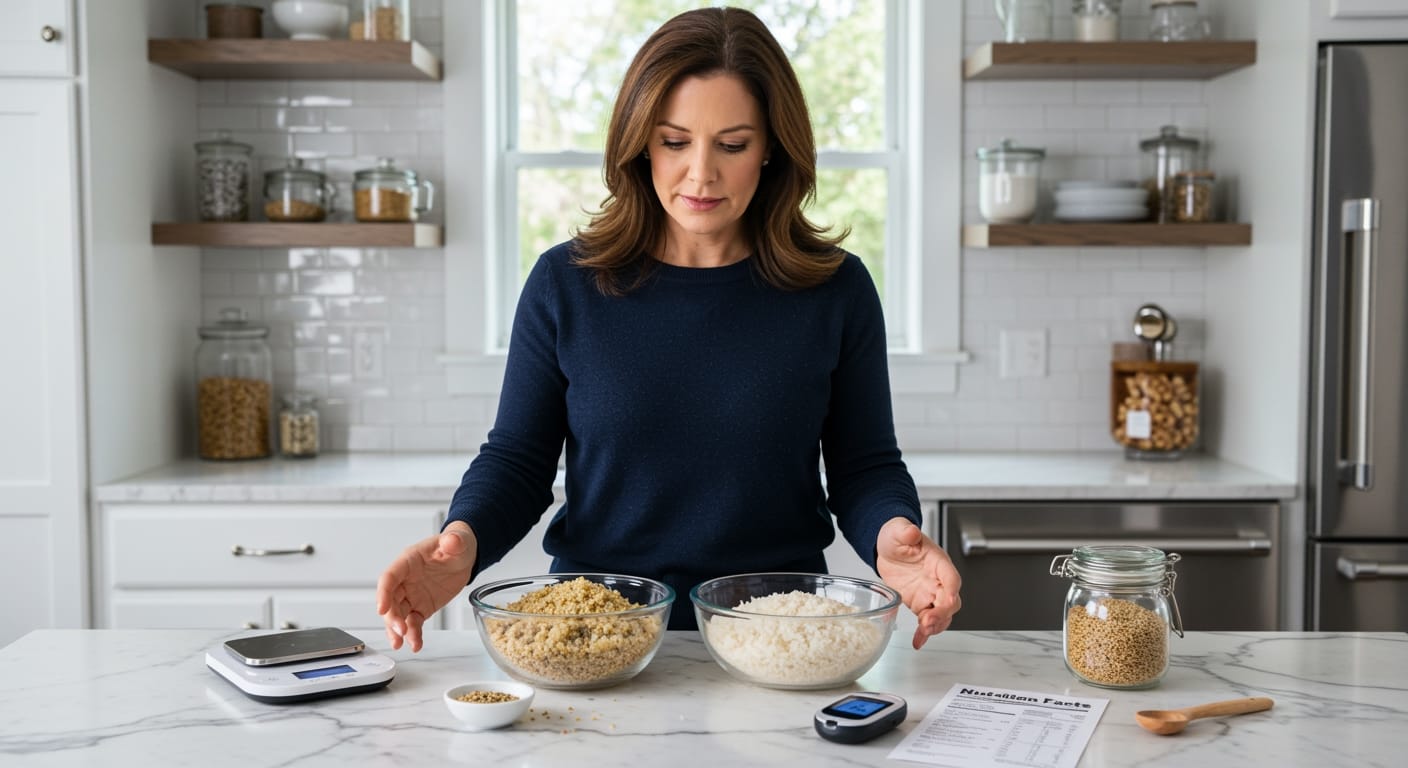✪ Key Takeaway: Quinoa has a lower glycemic index than white rice but similar to brown rice, making it a good but not superior choice for diabetes.
Introduction
You walk down the grocery aisle and see quinoa priced three times higher than rice.
The marketing tells you quinoa is a superfood that will magically control your blood sugar better than rice.
Hi, I’m Abdur, your nutrition coach and today I’m going to break down the real science behind quinoa versus rice for diabetes management so you can make smart food choices without falling for expensive marketing tricks.
What Makes Quinoa Different From Rice?
Quinoa is technically a seed that we eat like a grain.
Rice is an actual grain that comes from grass plants.
This difference matters because quinoa contains all nine essential amino acids your body needs.
Rice lacks some of these amino acids, making it an incomplete protein.
Quinoa also packs more fiber per serving than white rice.
One cup of cooked quinoa gives you about 5 grams of fiber while white rice only provides 0.6 grams.
Brown rice falls somewhere in between with about 4 grams of fiber per cup.
✪ Fact: Quinoa contains twice as much protein as most grains, with about 8 grams per cooked cup.
How Do Their Glycemic Index Values Compare?
The glycemic index tells us how quickly foods raise blood sugar levels.
Quinoa has a glycemic index of about 53, which puts it in the low to moderate range.
White rice scores much higher at 73, making it a high glycemic food.
Brown rice sits at around 50, very similar to quinoa.
These numbers mean quinoa will cause a slower, more gradual rise in blood sugar compared to white rice.
However, the difference between quinoa and brown rice is minimal from a blood sugar perspective.
Your portion size matters more than the small glycemic index difference between these two options.
✪ Pro Tip: Focus on portion control rather than obsessing over small glycemic index differences between healthy whole grains.
Which One Keeps You Full Longer?
Quinoa wins the satiety battle hands down.
The combination of protein and fiber in quinoa helps you feel full for longer periods.
White rice gets digested quickly, leaving you hungry again within a few hours.
Brown rice performs better than white rice but still falls short of quinoa for appetite control.
When you stay full longer, you naturally eat less throughout the day.
This helps with weight management, which is crucial for diabetes control.
The protein in quinoa also helps maintain stable blood sugar levels between meals.
✪ Note: Eating protein with carbohydrates slows down sugar absorption and improves blood glucose control.
What About Cost and Practical Considerations?
Quinoa costs significantly more than rice in most places around the world.
A pound of quinoa can cost three to five times more than the same amount of brown rice.
Rice is also more familiar to most people and easier to cook consistently.
Quinoa requires proper rinsing to remove its natural bitter coating called saponin.
Many people find quinoa has a nutty texture that takes time to get used to.
Rice is available everywhere, while quinoa might be harder to find in some areas.
For diabetes management, consistency in your eating habits matters more than choosing the most expensive superfood.
✪ Pro Tip: Choose the grain you can afford to eat regularly rather than splurging occasionally on expensive options.
Should You Switch From Rice to Quinoa?
The answer depends on your current rice choice and personal circumstances.
If you currently eat white rice regularly, switching to quinoa will definitely improve your blood sugar control.
However, switching from white rice to brown rice gives you almost the same benefits at a fraction of the cost.
If you already eat brown rice, quinoa offers only marginal improvements for diabetes management.
The extra protein and slightly better fiber content in quinoa are nice bonuses but not game-changers.
Your money might be better spent on increasing your vegetable intake or buying higher quality proteins.
Both quinoa and brown rice can fit perfectly into a diabetes-friendly eating plan when consumed in appropriate portions.
✪ Fact: A half-cup serving of cooked quinoa or brown rice contains about 22 grams of carbohydrates.
The Bottom Line
Quinoa is better than white rice for diabetes management but only marginally better than brown rice.
The best grain for diabetes is the one you can afford to eat consistently as part of a balanced diet.
I would love to hear about your experience with quinoa or rice in your diabetes management journey, so please share your thoughts in the comments below.
References
At NutritionCrown, we use quality and credible sources to ensure our content is accurate and trustworthy. Below are the sources referenced in creating this article:
- Dr. Mohan’s Diabetes Specialities Centre: Quinoa vs Rice: Which is Better for Blood Sugar Control?
- Fitterfly: Is Quinoa Good for Diabetes?
- Signos: Quinoa vs Rice Food Comparison
- Healthline: Why is Quinoa Good for Diabetes





